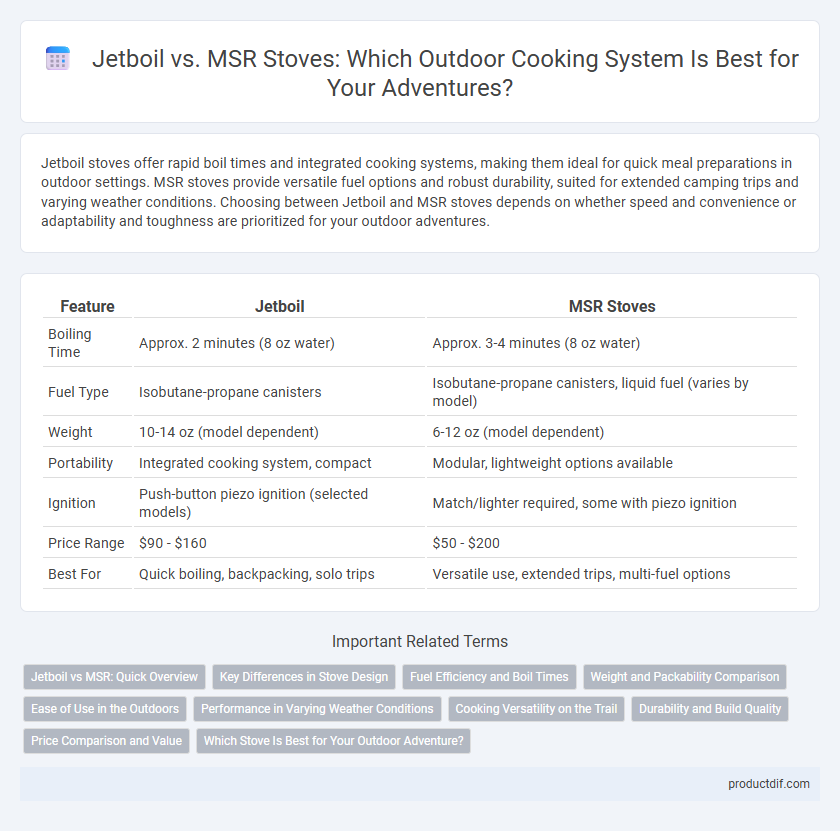Jetboil stoves offer rapid boil times and integrated cooking systems, making them ideal for quick meal preparations in outdoor settings. MSR stoves provide versatile fuel options and robust durability, suited for extended camping trips and varying weather conditions. Choosing between Jetboil and MSR stoves depends on whether speed and convenience or adaptability and toughness are prioritized for your outdoor adventures.
Table of Comparison
| Feature | Jetboil | MSR Stoves |
|---|---|---|
| Boiling Time | Approx. 2 minutes (8 oz water) | Approx. 3-4 minutes (8 oz water) |
| Fuel Type | Isobutane-propane canisters | Isobutane-propane canisters, liquid fuel (varies by model) |
| Weight | 10-14 oz (model dependent) | 6-12 oz (model dependent) |
| Portability | Integrated cooking system, compact | Modular, lightweight options available |
| Ignition | Push-button piezo ignition (selected models) | Match/lighter required, some with piezo ignition |
| Price Range | $90 - $160 | $50 - $200 |
| Best For | Quick boiling, backpacking, solo trips | Versatile use, extended trips, multi-fuel options |
Jetboil vs MSR: Quick Overview
Jetboil stoves are renowned for their rapid boiling times and integrated cooking systems, ideal for ultralight backpacking and quick meal preparation. MSR stoves offer versatile, durable designs with superior flame control, suitable for diverse outdoor cooking needs and harsh conditions. Choosing between Jetboil and MSR depends on priorities like speed, weight, and cooking flexibility in outdoor adventures.
Key Differences in Stove Design
Jetboil stoves feature an integrated cooking system with a built-in heat exchanger and a cup designed to maximize fuel efficiency and boiling speed, ideal for quick meals and boiling water during backpacking. MSR stoves offer modular designs emphasizing versatility and repairability, with separate components like burner heads and pots that accommodate various cooking styles and fuels. While Jetboil prioritizes compact, all-in-one convenience, MSR stoves deliver adaptability and ruggedness for extended outdoor expeditions.
Fuel Efficiency and Boil Times
Jetboil stoves excel in fuel efficiency with their integrated heat exchanger and insulated cooking cup, allowing water to boil in just under two minutes using minimal fuel. MSR stoves offer versatile fuel compatibility and consistent performance but typically require longer boil times, averaging around three to four minutes. For ultralight backpackers prioritizing speed and fuel savings, Jetboil provides superior efficiency, while MSR suits those needing adaptability across varied fuel types.
Weight and Packability Comparison
Jetboil stoves typically weigh between 14 to 16 ounces, offering a compact, integrated design that maximizes packability for ultralight backpacking. MSR stoves, such as the PocketRocket series, generally weigh around 2 to 3 ounces but require additional components like pots and windshields, which can increase overall pack weight and bulk. When prioritizing weight and packability, Jetboil provides a more streamlined all-in-one solution, while MSR offers modular flexibility with a slightly lighter stove base.
Ease of Use in the Outdoors
Jetboil stoves offer intuitive push-button igniters and streamlined designs for quick setup and one-handed operation, ideal for fast meal preparation while backpacking. MSR stoves provide versatile control with adjustable flame settings and robust build quality, which can require more time to assemble but allow precise cooking in varied outdoor conditions. Both brands prioritize reliability, but Jetboil excels in convenience for users needing rapid boiling, whereas MSR is preferred by those valuing customizable flame control.
Performance in Varying Weather Conditions
Jetboil stoves excel in windy and damp conditions due to their integrated heat exchangers and airtight burner design, ensuring rapid boil times and fuel efficiency. MSR stoves offer superior versatility with adjustable flame control and robust construction, performing reliably in extreme cold and high-altitude environments. Both brands prioritize wind resistance, but Jetboil's compact system favors quick, efficient cooking, while MSR's modular setups are better suited for prolonged, adaptive outdoor adventures.
Cooking Versatility on the Trail
Jetboil stoves excel in rapid boiling and compact design, making them ideal for quick meals and boiling water on the trail. MSR stoves offer superior cooking versatility with adjustable flame control and stable support for various cookware, allowing for cooking techniques beyond boiling, such as simmering and frying. Hikers seeking flexible meal preparation options often prefer MSR stoves for their ability to handle diverse outdoor cooking styles.
Durability and Build Quality
Jetboil stoves feature a sturdy, integrated design utilizing high-quality aluminum and stainless steel components, ensuring excellent durability in rugged outdoor conditions. MSR stoves are renowned for their robust all-metal construction, often incorporating titanium and stainless steel, which offers superior resistance to wear, corrosion, and extreme environments. Both brands provide reliable build quality, but MSR generally leads in longevity and maintenance ease due to their modular design and replaceable parts.
Price Comparison and Value
Jetboil stoves typically range from $100 to $150, offering integrated cooking systems that prioritize fast boiling times and lightweight design, ideal for ultralight backpacking. MSR stoves vary between $70 and $200, providing versatile options from compact canister stoves to multi-fuel models, emphasizing durability and customizable setups. While Jetboil offers convenience and speed at a moderate price, MSR delivers a broader spectrum of value by catering to different outdoor cooking needs and budget ranges.
Which Stove Is Best for Your Outdoor Adventure?
Jetboil stoves excel in quick boiling times and integrated systems, making them ideal for fast-paced trips and minimal packing. MSR stoves offer versatile fuel options and robust durability, better suited for extended expeditions and diverse cooking needs. Choosing the best stove depends on whether you prioritize speed and compactness or adaptability and long-term reliability.
Jetboil vs MSR Stoves Infographic

 productdif.com
productdif.com